Module 5 My school day U3 Language in use. 课件(共43张PPT)
文档属性
| 名称 | Module 5 My school day U3 Language in use. 课件(共43张PPT) |
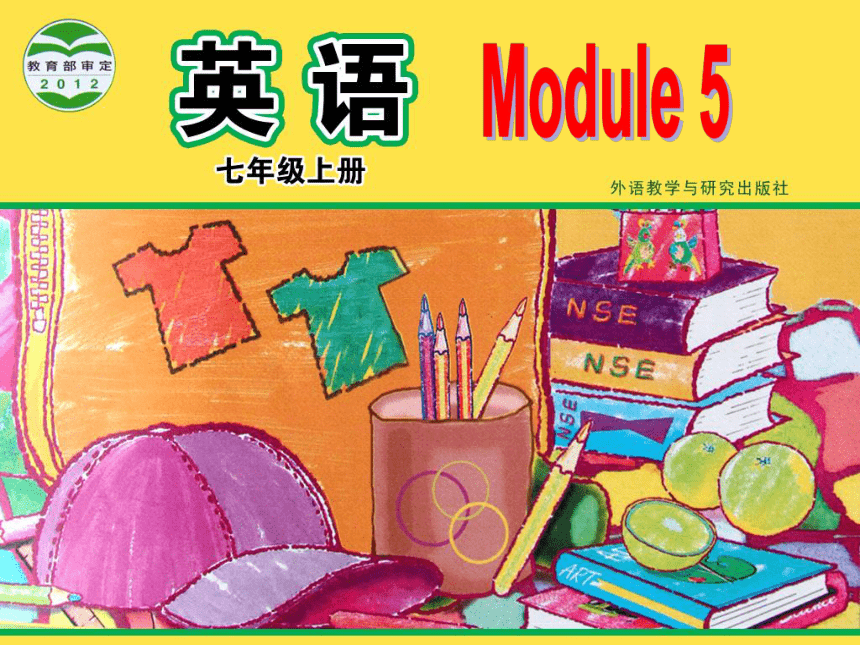
|
|
| 格式 | zip | ||
| 文件大小 | 1.2MB | ||
| 资源类型 | 试卷 | ||
| 版本资源 | 外研版 | ||
| 科目 | 英语 | ||
| 更新时间 | 2021-09-15 00:00:00 | ||
图片预览



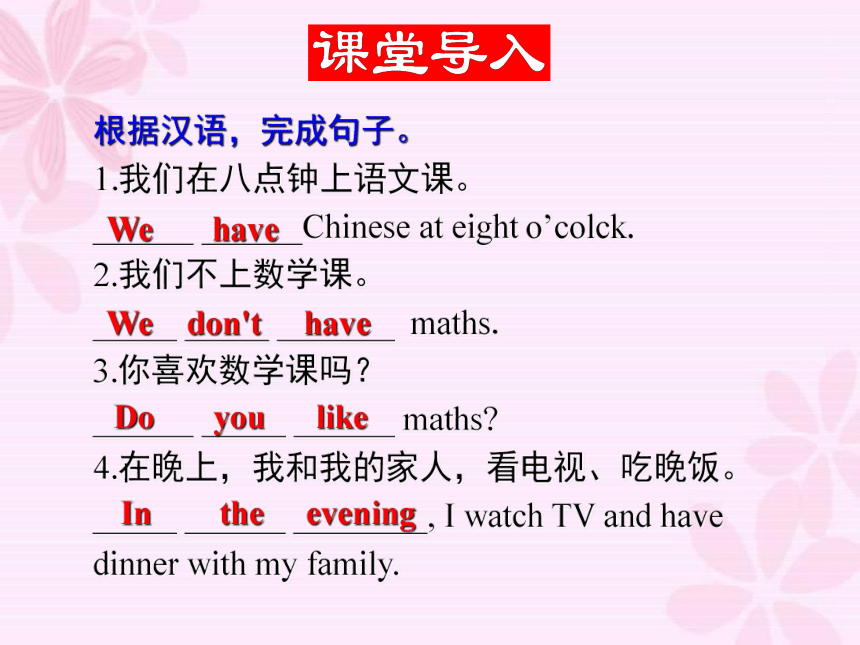
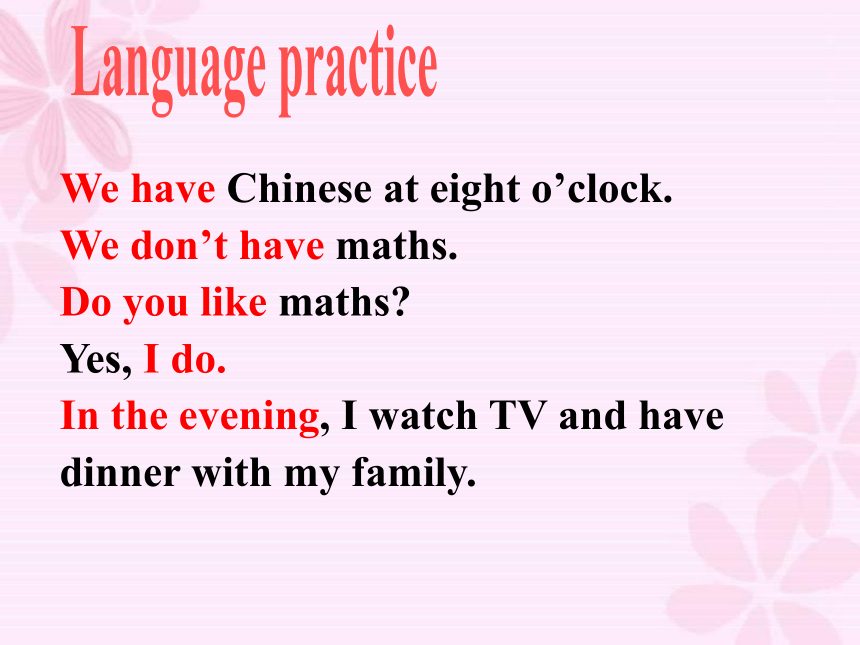

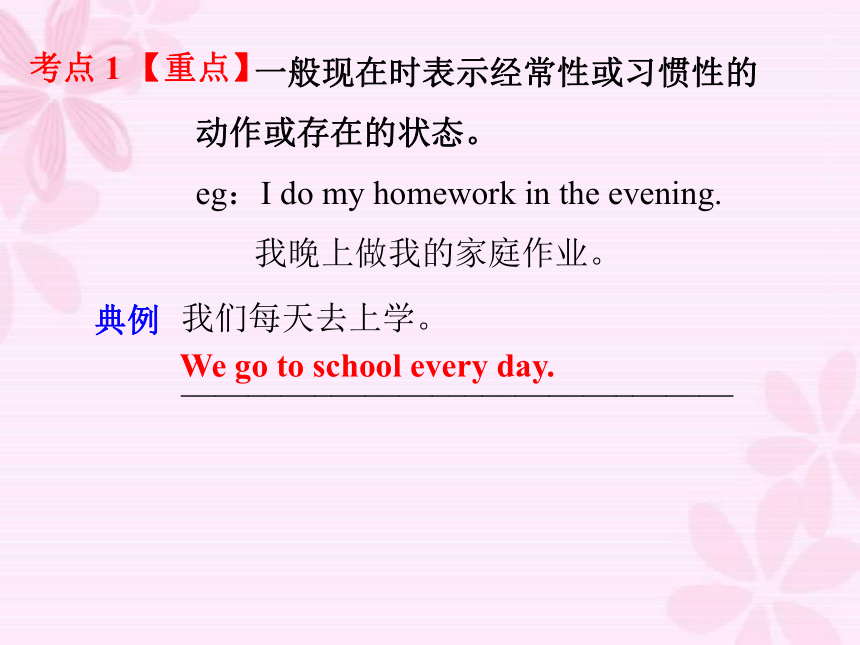

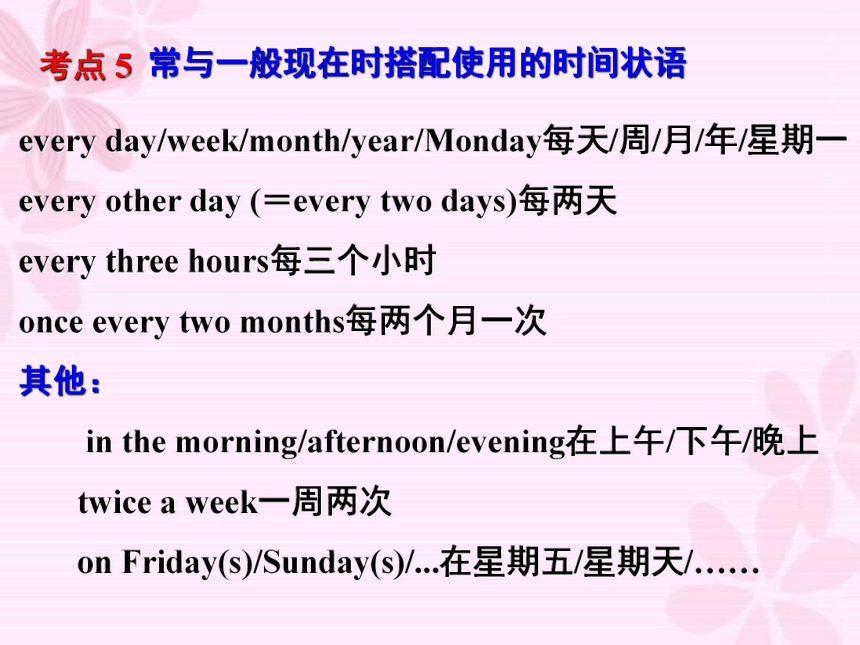
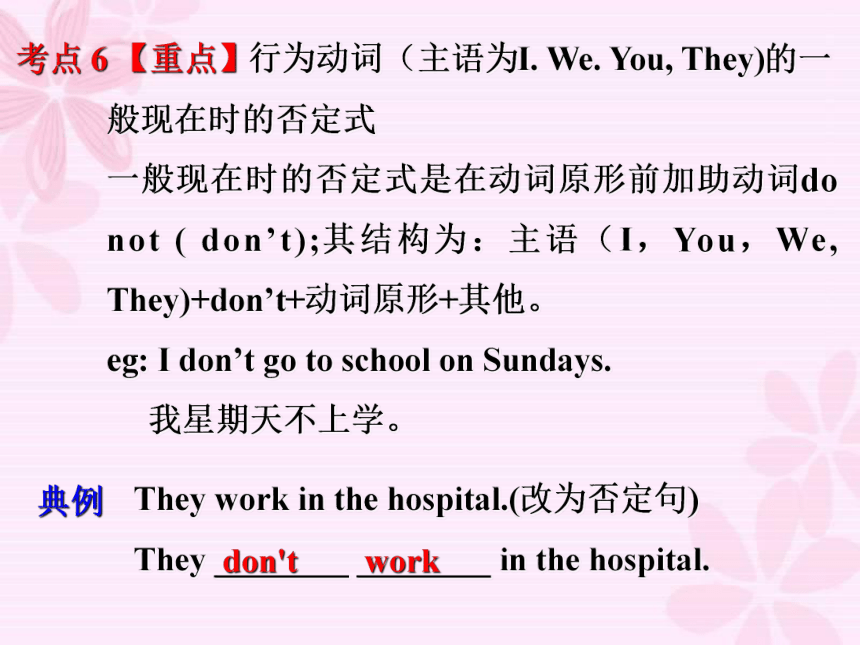
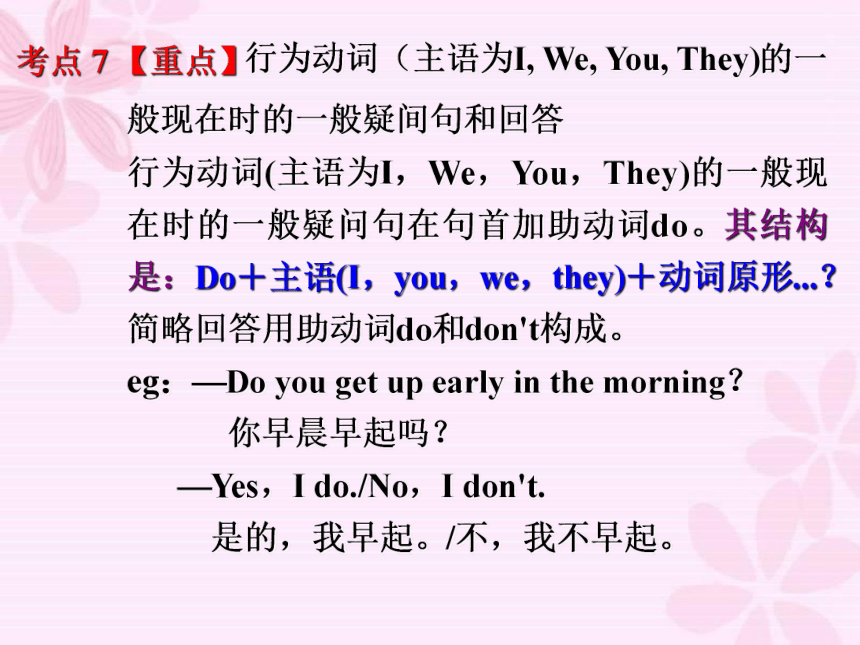
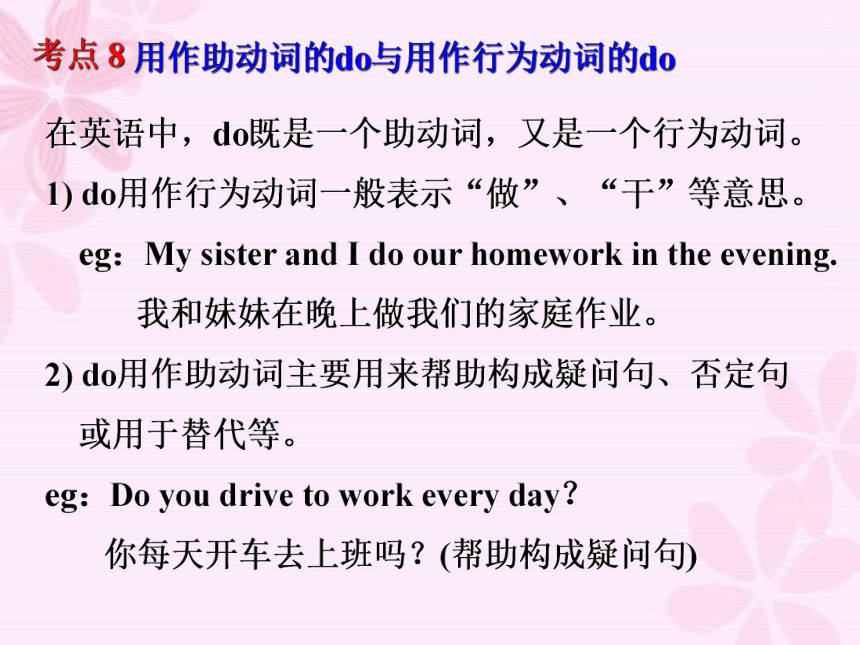
文档简介
(共43张PPT)
根据汉语,完成句子。
1.我们在八点钟上语文课。
______
______Chinese
at
eight
o’colck.
2.我们不上数学课。
_____
_____
_______
maths.
3.你喜欢数学课吗?
______
_____
______
maths?
4.在晚上,我和我的家人,看电视、吃晚饭。
_____
______
________,
I
watch
TV
and
have
dinner
with
my
family.
We
have
We
don't
have
Do
you
like
In
the
evening
We
have
Chinese
at
eight
o’clock.
We
don’t
have
maths.
Do
you
like
maths?
Yes,
I
do.
In
the
evening,
I
watch
TV
and
have
dinner
with
my
family.
行为动词的一般现在时
(1)
语法讲解
行为动词指除动词be外,一切可以单独作谓语的动词。动词be一般表示状态,而行为动词大都用来表示动作,如work,study,swim等。行为动词的一般现在时的结构为:
主语
(I,You,We,They)+动词原形+其他。
典例
我们每天去上学。
_________________________________
考点
1
【重点】
一般现在时表示经常性或习惯性的动作或存在的状态。
eg:I
do
my
homework
in
the
evening.
我晚上做我的家庭作业。
We
go
to
school
every
day.
考点
2
表示主语的特征、性格或能力等。
eg:
We
love
sports.
我们喜欢运动。
典例
他们说英语。
_________________________________
They
speak
English.
考点
3
表示客观事实或普遍真理。
eg:
The
earth
goes
around
the
sun.
地球绕着太阳转。
考点
4
有些表示短暂动作的动词如
begin,come,leave,start等常用一般现在时表示按计划或安排要发生的动作。
eg:The
train
leaves
at
12:30.
火车十二点半离开。
考点
5
常与一般现在时搭配使用的时间状语
every
day/week/month/year/Monday每天/周/月/年/星期一
every
other
day
(=every
two
days)每两天
every
three
hours每三个小时
once
every
two
months每两个月一次
其他:
in
the
morning/afternoon/evening在上午/下午/晚上
twice
a
week一周两次
on
Friday(s)/Sunday(s)/...在星期五/星期天/……
考点
6
【重点】
行为动词(主语为I.
We.
You,
They)的一般现在时的否定式
一般现在时的否定式是在动词原形前加助动词do
not
(
don’t);其结构为:主语(I,You,We,
They)+don’t+动词原形+其他。
eg:
I
don’t
go
to
school
on
Sundays.
我星期天不上学。
典例
They
work
in
the
hospital.(改为否定句)
They
________
________
in
the
hospital.
don't
work
考点
7
【重点】
行为动词(主语为I,
We,
You,
They)的一般现在时的一般疑间句和回答
行为动词(主语为I,We,You,They)的一般现在时的一般疑问句在句首加助动词do。其结构是:Do+主语(I,you,we,they)+动词原形...?简略回答用助动词do和don't构成。
eg:—Do
you
get
up
early
in
the
morning?
你早晨早起吗?
—Yes,I
do./No,I
don't.
是的,我早起。/不,我不早起。
考点
8
用作助动词的do与用作行为动词的do
在英语中,do既是一个助动词,又是一个行为动词。
1)
do用作行为动词一般表示“做”、“干”等意思。
eg:My
sister
and
I
do
our
homework
in
the
evening.
我和妹妹在晚上做我们的家庭作业。
2)
do用作助动词主要用来帮助构成疑问句、否定句
或用于替代等。
eg:Do
you
drive
to
work
every
day?
你每天开车去上班吗?(帮助构成疑问句)
They
don't
work
on
Sundays.
他们星期天不工作。(帮助构成否定句)
—Do
you
like
the
job?你喜欢这份工作吗?
—Yes,I
do.是的,我喜欢。(用于替代)
We
go
to
the
park
at
weekends.
(改为一般疑问句)
______
you
____
to
the
park
at
weekends?
典例
Do
go
Group
discussion
1
Work
in
pairs
to
talk
about
your
activity
in
a
week.
I
don’t
go
to
school
on
Sunday.
I
go
to
the
park
on
Sunday.
go
to
school
get
up
very
late
see
my
grandparents
play
games
with
friends
play
basketball
read
a
book
watch
TV
do
my
homework
2
Match
the
words
in
Column
A
with
the
words
and
expressions
in
Column
B.
A
B
1
have
a)
dinner
b)
your
homework
c)
to
school
2
do
d)
a
break
e)
an
English
lesson
f)
to
bed
3
go
g)
home
Make
phrases
with
do,
have
or
go.
1.
______
dinner
2.
______
your
homework
3.
______to
school
4.
______
a
break
5.
______
an
English
lesson
6.
______
housework
7.
______
to
bed
8.
______
home
have
have
have
do
do
go
go
go
learning
to
learn
We
often
use
have,
do
and
go
in
English.
Make
notes
of
all
expressions
you
hear
or
see:
have
breakfast,
do
exercise,
go
swimming.
1、I
_______at
seven.
I
don’t
_______at
half
past
seven.
2、I____________at
eight.
I
________________at
half
past
eight.
3、I
___________at
twelve.
I________________at
half
past
eleven.
4、I
____________at
three.
I
________________at
four.
5、We
______________at
four.
We___________________at
five.
get
up
get
up
go
to
school
don’t
go
to
school
have
lunch
don’t
have
lunch
leave
school
don’t
leave
school
play
basketball
don’t
play
basketball
get
up
go
to
school
have
lunch
leave
school
play
basketball
Now
talk
about
your
school
day.
英语时间表达方式:
时间
先小时后分钟
先分钟后小时
整点
6:00
钟点数(+o’clock)
six
(o’clock)
分<30
6:20
six
twenty
分钟+past+钟点数
twenty
past
six
分=30
6:30
six
thirty
half
past+钟点数
half
past
six
分>30
6:48
six
forty-eight
(60-分)+to+下一钟点数
twelve
to
seven
如果分钟是15,一般用a
quarter
来代替fifteen;
如果分钟是30,
一般用half来代替thirty。如:
9:15--a
quarter
past
nine
11:30--half
past
eleven
2:45--a
quarter
to
three
用英语写出下列时间
6:00
______________
5:30_____________\________________
8:10
_____________\________________
7:20
_____________\________________
9:50
_____________\________________
10:40
____________\________________
4:15
______________\_______________
3:45
______________\_______________
six
o’clock
five
thirty
half
past
five
eight
ten
ten
past
eight
seven
twenty
twenty
past
seven
nine
fifty
ten
to
ten
ten
forty
twenty
to
eleven
four
fifteen
a
quarter
past
four
three
forty-five
a
quarter
to
four
On
Friday
I
have
a
busy?
day.
I
(1)
_______
at
half
past
six
in
the
morning.
Then
I
wash
my
hands
and
face,
and
(2)
________________
at
seven.
At
half
past
seven,
I
(3)
_____________,
and
(4)
___________
at
eight.
There
are
four
lessons
in
the
morning.
At
twenty
to
ten,
we
(5)
______________
for
twenty
minutes.
We
go
to
the
playground
and
I
talk
with
my
friends.
We
(6)
____________
in
the
school
dining
hall.
In
the
afternoon,
we
have
two
lessons
and
go
home
at
half
past
three.
I
don’t
(7)
_____________
on
Friday
evening.
I
do
it
on
Saturday.
3
Complete
the
passage
with
the
expressions
from
the
box.
get
up
have
breakfast
go
to
school
start
work
have
a
break
have
lunch
do
homework
do
homework
get
up
go
to
school
have
a
break
have
breakfast
have
lunch
start
work
My
Friday
知识点
1
busy/'b?zi/adj.
忙的;繁忙的
busy的反义词是free,busy常用结构:be
busy
with
sth.表示“忙于某事”,后接名词;be
busy
(in)
doing
sth.表示“忙于做某事”,in可省略。
eg:—What
are
you
busy
with
every
day?
你每天在忙什么?
—I
am
busy
getting
ready
for
my
exam.
我忙着为考试做准备。
考向
典例
He
has
a
lot
of
homework
to
do,so
he
is
very
b_____
today.
usy
My
Sunday
I
don’t
go
to
school
on
Sunday,
but
I
go
to
the
park
on
Sunday.
There
are
many
people
in
the
park.
I
see
many
flowers
there
and
they
are
very
beautiful.
At
half
past
eleven,
I
have
lunch
in
the
park.
Then
I
have
a
break.
At
one
o’clock,
I
go
home.
玩得愉快
I
have
a
good
time
on
Sunday.
Hello,
I
am
Helen.
On
Sunday,
I
have
a
happy
day.
你知道at
/on
/in在表时间方面的用法吗?
at用在具体时刻前(几点钟或几点几分)。另外,at还可以用在at?night(在晚上),at?last(最后),at?weekends(在周末)at?noon(在中午)等固定短语中。
in表示泛指的上午/下午/晚上,或某周、某月、某季、某年、某世纪。另外,在某一些固定短语中要用in,如:in?the?day,
in?the?middle?of?the?day
。
on用在具体某一天或具体某一天的
上午/下午/晚上前。
4.
Complete
the
sentences
with
at,
in
or
on.
1.
We
go
to
school
_____
the
morning.
2.
We
don’t
go
to
school
_____
Sunday.
3.
We
don’t
have
a
science
lesson
_____Wednesday.
4.
I
get
up
_____
seven
o’clock.
5.
We
go
home
_____
the
afternoon.
6.
We
have
dinner
_____
half
past
six.
in
in
on
on
at
at
5
Complete
the
sentences
with
the
words
from
the
box.
because
break
homework
interesting
subject
1
We
have
maths
after_________
today.
2
I
like
maths.
It’s
my
favourite
________.
3
Our
maths
teacher
is
very
good
and
she
makes
it
___________?.
4
I
like
it
_________
it’s
interesting.
5
I
do
my
maths
_________
first
after
school
every
day.
homework
break
subject
because
interesting
2
知识点
考向
“make+宾语+adj.”结构中,形容词作宾语补足语,用来形容人的感受(happy,sad,pleased,angry等)或事物的性质或所处的状态。
eg:The
news
makes
me
happy.
这个消息使我高兴。
Our
maths
teacher
is
very
good
and
she
makes
it
interesting.我们的数学老师很好而且她使得它有趣。
make+宾语+adj.使……(变得)……
—We
all
like
Miss
Wang.
—
I
agree
with
you.
She
always
makes
her
English
classes
________.
(福州)
A.interested B.interest
C.interesting
典例
【点拨】此题用分析比较法。句意:——我们都喜欢王老师。——我同意你的观点。她总是使她的英语课有趣。interested修饰人,interesting则修饰物。故选C。
C
In
the
UK,
children
have
five
lessons
in
the
day
and
finish?
school
at
half
past
three
in
the
afternoon.
After
school
they
go
swimming,
play
football,
have
music
lessons
and
play
with
their
friends.
They
also
do
homework
like
you.
The
school
day
in
the
UK
3
知识点
考向
英语习惯上说
finish
doing
sth.,不能说
finish
to
do
sth.。
eg:Do
you
finish
watering
the
flowers?
你浇完花了吗?
finish/'fInI?/v.完成;结束;用尽
后加名词、代词、动名词作宾语。
eg:When
does
he
finish
college?
他何时大学毕业?
—
Can
you
finish
______
these
books
before
10
o'clock?
—
Yes,I
can.(四川雅安)
A.to
read B.read C.reads D.reading
典例
【点拨】此题考查非谓语动词的用法。finish后面要跟名词或动名词作宾语,故选D。
D
Talking
about
your
ideal
school
day
6
Look
through
Module
5
and
find
expressions
to
say
what
you
do
and
enjoy
every
day.
go
to
school
play
football
…
The
teacher’s
ideal
school
day
7:30
am
go
to
school
8:10
am
start
work
10:00
am
have
a
break
12:30
pm
have
lunch
2:00
pm
study
and
prepare
tomorrow’s
lesson
4:00
pm
watch
an
English
film
5:00
pm
go
home
Now
complete
the
table
with
information
about
your
ideal
school
day.
8:00
am
go
to
school
10:00
am
…
12:00
am
…
7
Work
in
pairs.
Talk
about
your
ideal
school
day.
I’m
Huang
Zeyang,
a
student
at
Wuning
No.
1
Primary
School.
Every
day
I
get
up
at
6:30.
I
have
breakfast
at
about
6:45.
Then
I
go
to
school
on
foot,
because
my
home
is
not
far
from
the
school
and
my
parents
are
both
busy.
I
get
to
school
at
7:20.
At
7:50
I
read
English
and
Chinese.
I
do
morning
exercise
at
8:20.
Classes
begin
at
8:55.
A
sample
We
have
three
classes
in
the
morning.
I
have
lunch
at
11:20.
The
lunch
is
very
good,
and
I
like
it.
Afternoon
classes
begin
at
12:40.
We
have
three
classes
in
the
afternoon.
At
3:15
I
play
sports
or
play
the
flute.
I
go
home
at
4:00.
Then
I
do
my
homework.
I
have
dinner
at
about
5:20.
I
often
watch
CCTV
news
at
7:00.
I
go
to
bed
at
8:00.
What
about
your
school
day?
Can
you
tell
me,
please?
本节课主要掌握单词:park,
busy,
wash,
face,
minute同时复习巩固单元内所学其他词汇;总结巩固I,
you,
we
,
they作主语的一般现在时;以及Do,
Don’t
的用法;
介词at
,
in,
on和与时间连用的用法。
一、用括号内所给词的适当形式填空
1.They
______
(like)
playing
football.
2.I
____
(go)
to
school
at
half
past
seven
every
morning.
3.They
__________
(not
have)
history
on
Friday.
4.___
you
_____
(go)
to
bed
at
nine
every
evening?
5.Lily
and
Lucy
________
(not
eat)
sugar
in
the
evening.
don't
eat
like
go
don't
have
go
Do
二、选词填空
6.My
brother
goes
to
work
_____
eight
o'clock.
7.Look!
It's
half
______
seven.
Let's
go
to
school.
8.I
go
to
play
football
with
my
friends
______
Saturday
afternoon.
9.We
get
up
at
twenty
_____
seven
every
day,and
we
have
breakfast
at
about
seven
o'clock.
10.Do
you
watch
TV
_____
the
evening?
in
at
past
on
to
in,at,on,to,past
三、单项选择
11.They
______
have
any
lessons
on
Saturdays.
A.aren't
B.don't
C.doesn't
D.Not
12.They
usually
________
a
walk
after
supper.
A.take
B.takes
C.is
taking
D.will
take
【点拨】have为行为动词,且主语不是第三人称单数形式,故改为否定句时要借助于助动词don't。
【点拨】 根据usually可知用一般现在时,故选A。
A
B
13.My
parents
often
________
me
some
gifts
on
my
birthday.
A.buy
B.will
buy
C.buys
D.has
bought
14.—
________
you
do
your
homework
in
the
evening?
—
Of
course.
A.Does
B.Are
C.Do
D./
15.
—What
do
you
often
do
at
weekends?
—I
often
________
my
grandparents.
A.visit
B.visited
C.have
visited
D.will
visit
A
A
C
四、句型转换
16.They
often
go
to
work
at
weekdays.(改为一般疑问句)
____
____
often
____
to
work
at
weekdays?
17.We
do
our
homework
in
the
evening
(改为否定句)
We
______
______
our
homework
in
the
evening.
18.We
have
lunch
at
12:00.(对画线部分提问)
______
_____
_____
you
______
lunch?
19.We
have
some
apples
on
the
desk.(改为否定句)
We
______
______
______
apples
on
the
desk.
20.I
like
Chinese
and
English.(改为否定句)
I
______
_____
Chinese
____
English.
Do
they
go
don't
do
What
time
do
don't
have
any
don't
like
or
have
Homework
1.
抄写单词,每个5遍,每个短语3遍,意思一遍。
2.
读熟U1的对话,
U2的短文,记住本模块所学单词、短语、句型和知识点。
3.
完成本单元的基础过关训练。
4.
预习下节课的内容。
根据汉语,完成句子。
1.我们在八点钟上语文课。
______
______Chinese
at
eight
o’colck.
2.我们不上数学课。
_____
_____
_______
maths.
3.你喜欢数学课吗?
______
_____
______
maths?
4.在晚上,我和我的家人,看电视、吃晚饭。
_____
______
________,
I
watch
TV
and
have
dinner
with
my
family.
We
have
We
don't
have
Do
you
like
In
the
evening
We
have
Chinese
at
eight
o’clock.
We
don’t
have
maths.
Do
you
like
maths?
Yes,
I
do.
In
the
evening,
I
watch
TV
and
have
dinner
with
my
family.
行为动词的一般现在时
(1)
语法讲解
行为动词指除动词be外,一切可以单独作谓语的动词。动词be一般表示状态,而行为动词大都用来表示动作,如work,study,swim等。行为动词的一般现在时的结构为:
主语
(I,You,We,They)+动词原形+其他。
典例
我们每天去上学。
_________________________________
考点
1
【重点】
一般现在时表示经常性或习惯性的动作或存在的状态。
eg:I
do
my
homework
in
the
evening.
我晚上做我的家庭作业。
We
go
to
school
every
day.
考点
2
表示主语的特征、性格或能力等。
eg:
We
love
sports.
我们喜欢运动。
典例
他们说英语。
_________________________________
They
speak
English.
考点
3
表示客观事实或普遍真理。
eg:
The
earth
goes
around
the
sun.
地球绕着太阳转。
考点
4
有些表示短暂动作的动词如
begin,come,leave,start等常用一般现在时表示按计划或安排要发生的动作。
eg:The
train
leaves
at
12:30.
火车十二点半离开。
考点
5
常与一般现在时搭配使用的时间状语
every
day/week/month/year/Monday每天/周/月/年/星期一
every
other
day
(=every
two
days)每两天
every
three
hours每三个小时
once
every
two
months每两个月一次
其他:
in
the
morning/afternoon/evening在上午/下午/晚上
twice
a
week一周两次
on
Friday(s)/Sunday(s)/...在星期五/星期天/……
考点
6
【重点】
行为动词(主语为I.
We.
You,
They)的一般现在时的否定式
一般现在时的否定式是在动词原形前加助动词do
not
(
don’t);其结构为:主语(I,You,We,
They)+don’t+动词原形+其他。
eg:
I
don’t
go
to
school
on
Sundays.
我星期天不上学。
典例
They
work
in
the
hospital.(改为否定句)
They
________
________
in
the
hospital.
don't
work
考点
7
【重点】
行为动词(主语为I,
We,
You,
They)的一般现在时的一般疑间句和回答
行为动词(主语为I,We,You,They)的一般现在时的一般疑问句在句首加助动词do。其结构是:Do+主语(I,you,we,they)+动词原形...?简略回答用助动词do和don't构成。
eg:—Do
you
get
up
early
in
the
morning?
你早晨早起吗?
—Yes,I
do./No,I
don't.
是的,我早起。/不,我不早起。
考点
8
用作助动词的do与用作行为动词的do
在英语中,do既是一个助动词,又是一个行为动词。
1)
do用作行为动词一般表示“做”、“干”等意思。
eg:My
sister
and
I
do
our
homework
in
the
evening.
我和妹妹在晚上做我们的家庭作业。
2)
do用作助动词主要用来帮助构成疑问句、否定句
或用于替代等。
eg:Do
you
drive
to
work
every
day?
你每天开车去上班吗?(帮助构成疑问句)
They
don't
work
on
Sundays.
他们星期天不工作。(帮助构成否定句)
—Do
you
like
the
job?你喜欢这份工作吗?
—Yes,I
do.是的,我喜欢。(用于替代)
We
go
to
the
park
at
weekends.
(改为一般疑问句)
______
you
____
to
the
park
at
weekends?
典例
Do
go
Group
discussion
1
Work
in
pairs
to
talk
about
your
activity
in
a
week.
I
don’t
go
to
school
on
Sunday.
I
go
to
the
park
on
Sunday.
go
to
school
get
up
very
late
see
my
grandparents
play
games
with
friends
play
basketball
read
a
book
watch
TV
do
my
homework
2
Match
the
words
in
Column
A
with
the
words
and
expressions
in
Column
B.
A
B
1
have
a)
dinner
b)
your
homework
c)
to
school
2
do
d)
a
break
e)
an
English
lesson
f)
to
bed
3
go
g)
home
Make
phrases
with
do,
have
or
go.
1.
______
dinner
2.
______
your
homework
3.
______to
school
4.
______
a
break
5.
______
an
English
lesson
6.
______
housework
7.
______
to
bed
8.
______
home
have
have
have
do
do
go
go
go
learning
to
learn
We
often
use
have,
do
and
go
in
English.
Make
notes
of
all
expressions
you
hear
or
see:
have
breakfast,
do
exercise,
go
swimming.
1、I
_______at
seven.
I
don’t
_______at
half
past
seven.
2、I____________at
eight.
I
________________at
half
past
eight.
3、I
___________at
twelve.
I________________at
half
past
eleven.
4、I
____________at
three.
I
________________at
four.
5、We
______________at
four.
We___________________at
five.
get
up
get
up
go
to
school
don’t
go
to
school
have
lunch
don’t
have
lunch
leave
school
don’t
leave
school
play
basketball
don’t
play
basketball
get
up
go
to
school
have
lunch
leave
school
play
basketball
Now
talk
about
your
school
day.
英语时间表达方式:
时间
先小时后分钟
先分钟后小时
整点
6:00
钟点数(+o’clock)
six
(o’clock)
分<30
6:20
six
twenty
分钟+past+钟点数
twenty
past
six
分=30
6:30
six
thirty
half
past+钟点数
half
past
six
分>30
6:48
six
forty-eight
(60-分)+to+下一钟点数
twelve
to
seven
如果分钟是15,一般用a
quarter
来代替fifteen;
如果分钟是30,
一般用half来代替thirty。如:
9:15--a
quarter
past
nine
11:30--half
past
eleven
2:45--a
quarter
to
three
用英语写出下列时间
6:00
______________
5:30_____________\________________
8:10
_____________\________________
7:20
_____________\________________
9:50
_____________\________________
10:40
____________\________________
4:15
______________\_______________
3:45
______________\_______________
six
o’clock
five
thirty
half
past
five
eight
ten
ten
past
eight
seven
twenty
twenty
past
seven
nine
fifty
ten
to
ten
ten
forty
twenty
to
eleven
four
fifteen
a
quarter
past
four
three
forty-five
a
quarter
to
four
On
Friday
I
have
a
busy?
day.
I
(1)
_______
at
half
past
six
in
the
morning.
Then
I
wash
my
hands
and
face,
and
(2)
________________
at
seven.
At
half
past
seven,
I
(3)
_____________,
and
(4)
___________
at
eight.
There
are
four
lessons
in
the
morning.
At
twenty
to
ten,
we
(5)
______________
for
twenty
minutes.
We
go
to
the
playground
and
I
talk
with
my
friends.
We
(6)
____________
in
the
school
dining
hall.
In
the
afternoon,
we
have
two
lessons
and
go
home
at
half
past
three.
I
don’t
(7)
_____________
on
Friday
evening.
I
do
it
on
Saturday.
3
Complete
the
passage
with
the
expressions
from
the
box.
get
up
have
breakfast
go
to
school
start
work
have
a
break
have
lunch
do
homework
do
homework
get
up
go
to
school
have
a
break
have
breakfast
have
lunch
start
work
My
Friday
知识点
1
busy/'b?zi/adj.
忙的;繁忙的
busy的反义词是free,busy常用结构:be
busy
with
sth.表示“忙于某事”,后接名词;be
busy
(in)
doing
sth.表示“忙于做某事”,in可省略。
eg:—What
are
you
busy
with
every
day?
你每天在忙什么?
—I
am
busy
getting
ready
for
my
exam.
我忙着为考试做准备。
考向
典例
He
has
a
lot
of
homework
to
do,so
he
is
very
b_____
today.
usy
My
Sunday
I
don’t
go
to
school
on
Sunday,
but
I
go
to
the
park
on
Sunday.
There
are
many
people
in
the
park.
I
see
many
flowers
there
and
they
are
very
beautiful.
At
half
past
eleven,
I
have
lunch
in
the
park.
Then
I
have
a
break.
At
one
o’clock,
I
go
home.
玩得愉快
I
have
a
good
time
on
Sunday.
Hello,
I
am
Helen.
On
Sunday,
I
have
a
happy
day.
你知道at
/on
/in在表时间方面的用法吗?
at用在具体时刻前(几点钟或几点几分)。另外,at还可以用在at?night(在晚上),at?last(最后),at?weekends(在周末)at?noon(在中午)等固定短语中。
in表示泛指的上午/下午/晚上,或某周、某月、某季、某年、某世纪。另外,在某一些固定短语中要用in,如:in?the?day,
in?the?middle?of?the?day
。
on用在具体某一天或具体某一天的
上午/下午/晚上前。
4.
Complete
the
sentences
with
at,
in
or
on.
1.
We
go
to
school
_____
the
morning.
2.
We
don’t
go
to
school
_____
Sunday.
3.
We
don’t
have
a
science
lesson
_____Wednesday.
4.
I
get
up
_____
seven
o’clock.
5.
We
go
home
_____
the
afternoon.
6.
We
have
dinner
_____
half
past
six.
in
in
on
on
at
at
5
Complete
the
sentences
with
the
words
from
the
box.
because
break
homework
interesting
subject
1
We
have
maths
after_________
today.
2
I
like
maths.
It’s
my
favourite
________.
3
Our
maths
teacher
is
very
good
and
she
makes
it
___________?.
4
I
like
it
_________
it’s
interesting.
5
I
do
my
maths
_________
first
after
school
every
day.
homework
break
subject
because
interesting
2
知识点
考向
“make+宾语+adj.”结构中,形容词作宾语补足语,用来形容人的感受(happy,sad,pleased,angry等)或事物的性质或所处的状态。
eg:The
news
makes
me
happy.
这个消息使我高兴。
Our
maths
teacher
is
very
good
and
she
makes
it
interesting.我们的数学老师很好而且她使得它有趣。
make+宾语+adj.使……(变得)……
—We
all
like
Miss
Wang.
—
I
agree
with
you.
She
always
makes
her
English
classes
________.
(福州)
A.interested B.interest
C.interesting
典例
【点拨】此题用分析比较法。句意:——我们都喜欢王老师。——我同意你的观点。她总是使她的英语课有趣。interested修饰人,interesting则修饰物。故选C。
C
In
the
UK,
children
have
five
lessons
in
the
day
and
finish?
school
at
half
past
three
in
the
afternoon.
After
school
they
go
swimming,
play
football,
have
music
lessons
and
play
with
their
friends.
They
also
do
homework
like
you.
The
school
day
in
the
UK
3
知识点
考向
英语习惯上说
finish
doing
sth.,不能说
finish
to
do
sth.。
eg:Do
you
finish
watering
the
flowers?
你浇完花了吗?
finish/'fInI?/v.完成;结束;用尽
后加名词、代词、动名词作宾语。
eg:When
does
he
finish
college?
他何时大学毕业?
—
Can
you
finish
______
these
books
before
10
o'clock?
—
Yes,I
can.(四川雅安)
A.to
read B.read C.reads D.reading
典例
【点拨】此题考查非谓语动词的用法。finish后面要跟名词或动名词作宾语,故选D。
D
Talking
about
your
ideal
school
day
6
Look
through
Module
5
and
find
expressions
to
say
what
you
do
and
enjoy
every
day.
go
to
school
play
football
…
The
teacher’s
ideal
school
day
7:30
am
go
to
school
8:10
am
start
work
10:00
am
have
a
break
12:30
pm
have
lunch
2:00
pm
study
and
prepare
tomorrow’s
lesson
4:00
pm
watch
an
English
film
5:00
pm
go
home
Now
complete
the
table
with
information
about
your
ideal
school
day.
8:00
am
go
to
school
10:00
am
…
12:00
am
…
7
Work
in
pairs.
Talk
about
your
ideal
school
day.
I’m
Huang
Zeyang,
a
student
at
Wuning
No.
1
Primary
School.
Every
day
I
get
up
at
6:30.
I
have
breakfast
at
about
6:45.
Then
I
go
to
school
on
foot,
because
my
home
is
not
far
from
the
school
and
my
parents
are
both
busy.
I
get
to
school
at
7:20.
At
7:50
I
read
English
and
Chinese.
I
do
morning
exercise
at
8:20.
Classes
begin
at
8:55.
A
sample
We
have
three
classes
in
the
morning.
I
have
lunch
at
11:20.
The
lunch
is
very
good,
and
I
like
it.
Afternoon
classes
begin
at
12:40.
We
have
three
classes
in
the
afternoon.
At
3:15
I
play
sports
or
play
the
flute.
I
go
home
at
4:00.
Then
I
do
my
homework.
I
have
dinner
at
about
5:20.
I
often
watch
CCTV
news
at
7:00.
I
go
to
bed
at
8:00.
What
about
your
school
day?
Can
you
tell
me,
please?
本节课主要掌握单词:park,
busy,
wash,
face,
minute同时复习巩固单元内所学其他词汇;总结巩固I,
you,
we
,
they作主语的一般现在时;以及Do,
Don’t
的用法;
介词at
,
in,
on和与时间连用的用法。
一、用括号内所给词的适当形式填空
1.They
______
(like)
playing
football.
2.I
____
(go)
to
school
at
half
past
seven
every
morning.
3.They
__________
(not
have)
history
on
Friday.
4.___
you
_____
(go)
to
bed
at
nine
every
evening?
5.Lily
and
Lucy
________
(not
eat)
sugar
in
the
evening.
don't
eat
like
go
don't
have
go
Do
二、选词填空
6.My
brother
goes
to
work
_____
eight
o'clock.
7.Look!
It's
half
______
seven.
Let's
go
to
school.
8.I
go
to
play
football
with
my
friends
______
Saturday
afternoon.
9.We
get
up
at
twenty
_____
seven
every
day,and
we
have
breakfast
at
about
seven
o'clock.
10.Do
you
watch
TV
_____
the
evening?
in
at
past
on
to
in,at,on,to,past
三、单项选择
11.They
______
have
any
lessons
on
Saturdays.
A.aren't
B.don't
C.doesn't
D.Not
12.They
usually
________
a
walk
after
supper.
A.take
B.takes
C.is
taking
D.will
take
【点拨】have为行为动词,且主语不是第三人称单数形式,故改为否定句时要借助于助动词don't。
【点拨】 根据usually可知用一般现在时,故选A。
A
B
13.My
parents
often
________
me
some
gifts
on
my
birthday.
A.buy
B.will
buy
C.buys
D.has
bought
14.—
________
you
do
your
homework
in
the
evening?
—
Of
course.
A.Does
B.Are
C.Do
D./
15.
—What
do
you
often
do
at
weekends?
—I
often
________
my
grandparents.
A.visit
B.visited
C.have
visited
D.will
visit
A
A
C
四、句型转换
16.They
often
go
to
work
at
weekdays.(改为一般疑问句)
____
____
often
____
to
work
at
weekdays?
17.We
do
our
homework
in
the
evening
(改为否定句)
We
______
______
our
homework
in
the
evening.
18.We
have
lunch
at
12:00.(对画线部分提问)
______
_____
_____
you
______
lunch?
19.We
have
some
apples
on
the
desk.(改为否定句)
We
______
______
______
apples
on
the
desk.
20.I
like
Chinese
and
English.(改为否定句)
I
______
_____
Chinese
____
English.
Do
they
go
don't
do
What
time
do
don't
have
any
don't
like
or
have
Homework
1.
抄写单词,每个5遍,每个短语3遍,意思一遍。
2.
读熟U1的对话,
U2的短文,记住本模块所学单词、短语、句型和知识点。
3.
完成本单元的基础过关训练。
4.
预习下节课的内容。
同课章节目录
- Starte
- Module 1 My teacher and my friends
- Module 2 My English lesson
- Module 3 My English book
- Module 4 My everyday life
- Module 1 My classmates
- Unit 1 Nice to meet you.
- Unit 2 I'm Wang Lingling and I'm thirteen years ol
- Unit 3 Language in use.
- Module 2 My family
- Unit 1 Is this your mum?
- Unit 2 These are my parents.
- Unit 3 Language in use.
- Module 3 My school
- Unit 1 There are thirty students in my class.
- Unit 2 The library is on the left of the playgroun
- Unit 3 Language in use.
- Module 4 Healthy food
- Unit 1 We've got lots of apples.
- Unit 2 Is your food and drink healthy?
- Unit 3 Language in use.
- Module 5 My school day
- Unit 1 I love history.
- Unit 2 We start work at nine o'clock.
- Unit 3 Language in use.
- Revision module A
- Module 6 A trip to the zoo
- Unit 1 Does it eat meat?
- Unit 2 The tiger lives in Asia.
- Unit 3 Language in use.
- Module 7 Computers
- Unit 1 How do I write my homework on the computer?
- Unit 2 When do you use a computer?
- Unit 3 Language in use.
- Module 8 Choosing presents
- Unit 1 I always like birthday parties.
- Unit 2 She often goes to concerts.
- Unit 3 Language in use.
- Module 9 People and places
- Unit 1 We're enjoying the school trip a lot.
- Unit 2 They're waiting for buses or trains.
- Unit 3 Language in use.
- Module 10 Spring Festival
- Unit 1 Are you getting ready for Spring Festival?
- Unit 2 My mother's cleaning our houses and sweepin
- Unit 3 Language in use.
- Revision module B
